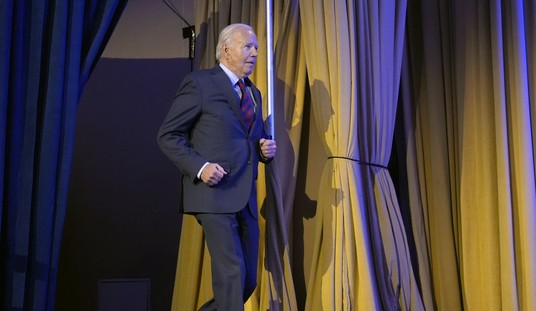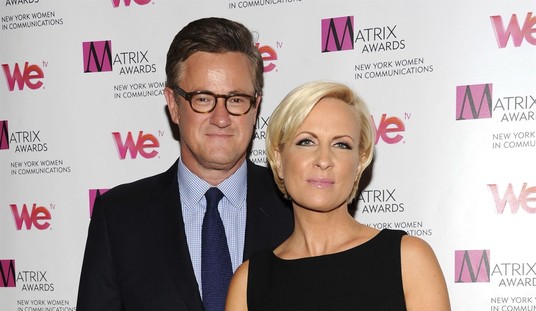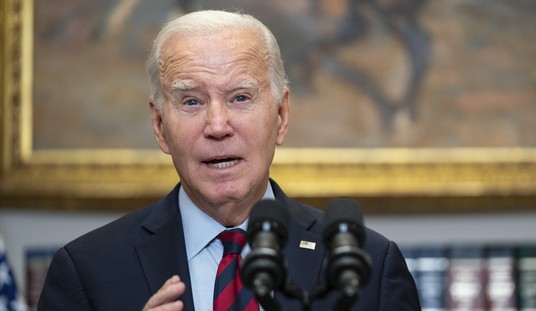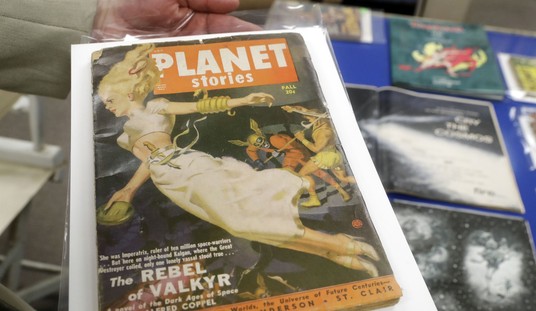//
Last weekend, Republicans waiting for the proverbial man on the white horse to ride in and save them from an unsatisfactory 2012 primary field got their answer, or at any rate the best answer they are likely to get: Texas Governor Rick Perry. And while Perry entered stage right, former Minnesota Governor Tim Pawlenty, my previous choice among the announced candidates in the field, exited stage center-right, leaving the choice – to me – an obvious one: Rick Perry for President, y’all.
The Governor From Central Casting
Perry is in many ways a blindingly obvious choice to fill a gap in the presidential field. He’s the longest-serving Governor in the history of the nation’s second-largest state, a state with a long and disputatious foreign border; his predecessor in the job served two terms as President. He’s won statewide election six times, a record matched only by one previous President (Bill Clinton, whose terms were shorter), and has held statewide office continuously for two decades, since Barack Obama was in law school. He’s defeated liberal icon Jim Hightower, survived the Democratic wave of 2006, and beaten African-American, Latino and female opponents (showing his ability to survive Obama-style identity politics), the last a primary challenge by a sitting Senator, Kay Bailey Hutchinson, who had Establishment backing as prominent as Dick Cheney. He’s never lost an election since winning his seat in the Texas Legislature in 1984. He served overseas in the Air Force, flying C-130 transports for five years during the Cold War in the mid-70s in places like Germany and Saudi Arabia, joining just as the Vietnam War was winding down (he’d been in an ROTC-style organization at Texas A&M). Like Mitt Romney, he has great hair and looks like a guy Hollywood would cast as a president – which may seem like an awfully silly way to pick a President, but one of Pawlenty’s problems seemed to be a lack of perceived gravitas arising from his decidedly nerdy appearance. Perry has no such problems.
In a red-blue nation, Perry has been a protean political figure, making a journey from Establishment Southern Democrat (in 1988 he was statewide chair for the Al Gore for President campaign) to Establishment Republican (in 1998 he was George W. Bush’s running mate, and he originally took office when Bush resigned after winning the 2000 election) to Tea Party-backed iconoclast (in 2010, as noted, he faced a moderate Establishment rebellion, and survived by cementing his popularity with Texas Tea Partiers and other conservative grassroots). But Perry has changed his politics more than his policies over the years (even as a Democrat he was distinguished as a foe of government spending); while he has any politician’s vulnerability to charges of flip-flopping, pandering and beliefs of convenience at times, he has nothing like Mitt Romney’s vast catalogue of flip-flops in a career in public office barely a fifth as long.
Perry’s strong economic record as Texas Governor, swimming against the national tide, is his strongest selling point (and as such has attracted the most immediate and incoherent assaults). He may have gotten a D in economics in college, when he was still a Democrat, but his much more relevant grade came in 2009, when his state’s bond rating was upgraded to AA+ by Standard & Poor’s on the basis of his 2010-11 budget.
The Real Thing
Perry’s record is solidly but far from perfectly conservative; honestly, there’s not that much difference between him and Pawlenty that’s not explained by the difference between Texas and Minnesota. He’s not the Platonic ideal Republican candidate. He’s not a brilliant policy innovator like Bobby Jindal, a budget wonk extraordinaire like Paul Ryan, or an exemplar of Tea Party purity like Michele Bachmann. He hasn’t faced down a hostile polity like Chris Christie or Scott Walker, or led a faction within the party like Jim DeMint or Pat Toomey. He lacks Marco Rubio’s spellbinding eloquence, Sarah Palin’s biting wit or Allen West’s martial ferocity. He hasn’t been a successful businessman like Romney or Herman Cain, or a decorated combat veteran like West or John McCain. He’s a career politician. And as a 61 year old white male Texas Baby Boomer who has been in office for a quarter century and who sometimes sounds like George W. Bush, he’s not in any way a “new face” for the party.
But the Republican Party right now has plenty of enthusiasm and plenty of ideas. What it has been looking for is a leader with credibility in governance, and that’s Perry. With over a decade in office in a huge, Republican-dominated state, Perry isn’t selling castles in the air, he’s selling an alternative vision of how government should operate, implemented and road-tested through good times and bad. From the new security demands of 9/11, to a decade of balancing budgets with ebbing and flowing tax revenues, to creating jobs through two recessions, to immigration from neighboring Mexico, to crises ranging from Hurricanes Rita and Ike to eruptions of Islamic extremism at Fort Hood to every variety of social ill and social-issue controversy, Perry has had to grapple with the full menu of practical challenges that come with governing responsibility. Many a buck has stopped at his desk. His answers may not always have been ideal, but the voters will be able to judge him, for good and ill, on a long and proven record.
On my 2008 checklist of five types of experience we look for in presidential candidates, Perry scores strongly on two (executive experience and political leadership experience) by virtue of his long tenure as Texas Governor and the state party’s consistent success under his guidance. He’s not a combat veteran, but has worn his country’s uniform abroad. On foreign affairs, he’s somewhat typical of a long-serving border-state governor – he’s well-traveled and well-versed in immigration and trade issues (probably nobody in America has more practical experience dealing with immigration and the Mexican border), but still has much to prove on national security. He can also boast some private sector business experience from his time as a rancher before running for office – hardly a vast enterprise, but one that teaches a good deal from the ground level up about how to make ends meet. As I’ve noted before, no one factor is essential – although executive experience is by far the most important – and only two presidents (George Washington and George H.W. Bush) entered office with a strong resume in all five categories. So, Perry comes out looking pretty good on that test.
After 2 1/2 years of a President who entered the White House as a wish-projection object with no track record running anything, America deserves a leader who already knows how to lead and has gotten his rookie mistakes out of his system.
Holding Out For A Hero
Every successful presidential campaign requires a little touch of hero-worship and personality cult, although again the Obama experience demonstrates the dangers of overdosing on this sort of thing. Perry, as a poster boy for gun-toting Texans (he once shot a coyote while jogging), has inspired a bit of that. If you’ve seen the burgeoning “Rick Perry Facts” meme on the web (@rickperryfacts on Twitter, for example), after the mold of the Chuck Norris Facts, they’re a good example of pumping up Perry’s Texas tough guy image with the proper air of absurdity to avoid taking themselves too seriously. Nobody is going to depict Perry as a “Lightworker” who brings meaning to our lives, paint pictures of him astride a unicorn, or argue that he will fundamentally change the American people or hold back the tides. He’s simply a successful political leader who wants to apply his talents to improving how our federal government works, in many cases by imitating things that have already been done on the federal or state level in the past.
We all have our biases in preferring candidates. I know three of mine. One, which Perry fits just as have Pawlenty, Palin, Ryan, Rubio, Giuliani, Christie, and even Ronald Reagan, is a preference for Republicans who didn’t grow up wealthy or from prominent families, who have had to scrap their way up the ladder. I’ve voted for my share of to-the-manor-born Republicans and surely will again, but I still feel like Republicans who have had to claw their way up from middle-class or harder backgrounds tend to understand better at a gut level what the party really stands for, how hard it has to work to win, and why it appeals to Americans who don’t come from money and influence. But Perry doesn’t exactly fit the second (I tend to like candidates who are, like me, either lawyers or otherwise talkers, fast on their feet and clever in debate) and as for the third…so sue me, I’m a New Yorker, I prefer not to run Southerners, who tend to get counted out easily by much of the rest of the country. But it’s important to know your biases precisely so you don’t let them dictate your choices. I’d rather have run a candidate from another region of the country, but if Perry’s the best we have – and I think of the current field he is, and that whatever rumors you hear, we’re unlikely to get another top-shelf entrant – he’s my candidate. He doesn’t need to be my hero.
I’m the Map, I’m the Map, I’m the Map
Here is where the entry of Perry gets interesting and a little dicey. One of the primary reasons why I’d been open to possibly continuing to support Pawlenty even if he and Perry were both in the field is the 2012 map. As I have written before, the demographics of the true swing states in 2012 are likely to determine the two sides’ battle plans.
Let me offer my current seat-of-the-pants analysis of what that map will look like. This is based in good part on history and educated speculation; it’s too early to have meaningful hard data and dangerous to project too much certainty on current polling.
Realistically, given Obama’s current weaknesses and the traditional GOP loyalties of those states, I expect that Ohio, Florida and Indiana will end up in the GOP column so long as the Republican candidate is competitive – in other words, I can’t foresee the situation where Republicans lose the election because of a failure to win one of those states. Meanwhile, so long as the bottom doesn’t drop out on him, Obama’s likely to hold on in Minnesota, but Republicans will have opportunities in other states of the Midwest and Upper Midwest that have tended to run Democratic in the past two decades. I also think the demographics make it at least an open question whether the GOP can reclaim Virginia and North Carolina, although (1) Democrats mostly got drubbed there in 2009-2010 (besides the NC-GOV race) and (2) Obama only won NC by a hair in 2008 anyway, with less than 50% of the vote, so his margin of error there is almost nonexistent. In general, polling has tended to show that Obama is more popular than you’d expect from national numbers and the local partisan climate in federal worker-heavy Virginia, less popular than you’d expect in bitter, clinging Pennsylvania.
This is what my current map looks like:

You will notice that this puts the GOP 32 electoral votes short of the goal line, with the remaining votes up for graps divided into the following buckets:
The Midwest: 52 votes, 16 of them in the white-bread Upper Midwest states of Wisconsin and Iowa, 36 in the more traditional Rust Belt states of Pennsylvania and Michigan. These were states where the Democrats got slaughtered in 2010, with the GOP winning governorships in all four (as well as Senate races in PA & WI). New Hampshire’s 4 electoral votes are likely to trend in a similar direction as these four states, bringing the swing total to 56. If Ohio, Indiana and Minnesota come onto the table, that expands this region by another 39 votes. The Midwest is huge.
The Tidewater: VA & NC were both red states under Bush, but an influx of northerners to NC’s Research Triangle and to the federal worker and contractor dominated Northern Virginia region, combined with heavy African-American turnout, swung both states for Obama in 2008. (If you prefer, we can call these two the Big Ten and the ACC). VA & NC carry 28 electoral votes; adding them on this map leaves the Republican candidate just one state from victory.
The High Desert: CO & NV were mostly reliable red states that have been pulled left by demographic changes (growing Latino populations, influxes of Californians), heavy union organization in NV, and a pair of especially ineptly run state Republican organizations. NM is a more traditionally Democratic state, but was won by Bush in 2004 and went Republican in the 2010 Governor’s race (both NV & NM elected Hispanic Republican governors in 2010). I’ve tended to assume Obama wins all three, but they will be close-run races, with a total prize of 20 electoral votes.
The predominance of the Midwest would seem to argue for a candidate more suited to that region than a guy like Perry who embodies Texas swagger. That’s where Pawlenty could have come in handy, with his careful balance of blue-collar scrappiness and “Minnesota nice” and record of lasting two statewide terms in blue Minnesota without emerging hopelessly compromised. But in retrospect, the defining moment of Pawlenty’s campaign ended up coming when he blasted Mitt Romney’s health care record as “Obamaneycare” on a Sunday talk show, but refused to repeat the line in Romney’s presence in a June debate in New Hampshire. Pawlenty ended up with the worst of both worlds, looking less like a scrapper than like a rabbit-puncher who wasn’t willing to slug with the big boys. Pawlenty ended up bowing out with class as soon as his path to victory was closed off after the Ames Straw Poll.
But if Perry is perhaps not the best fit for the Midwest, one advantage of Perry being a Texan is that, as Richard Cohen sagely notes, Texas is culturally, geographically and politically part of both the South and the West. As a result, Perry is in some sense campaigning on home turf as far east as Florida and Virginia and as far west as Arizona and Idaho. He’ll look and sound very much like the kind of Republican candidate who wins elections in Virginia and North Carolina. And a corollary is that Texas’ unique historic and demographic ties to Mexico means that a successful long-time Texas politician like Perry is much more at home campaigning for Latino support than a candidate from the Upper Midwest would be, giving him a better chance of running strongly in the three High Desert states.
Buckle Your Seatbelts
Barack Obama, like Harry Reid in 2010 and Gray Davis in 2002, is likely to enter the 2012 election needing to make the race about something other than his own unpopular and unsuccessful record in office; indeed, that was one major reason why I’d been attracted to the relatively bland Pawlenty. Perry lacks obvious weak points – he can’t be painted as a guy who doesn’t know what he’s doing, and he can’t be caricatured as a Bill Simon-type corporate predator or a Sharron Angle-type batty extremist. Even some of his more eccentric-sounding ideas, like his criticism of the Sixteenth Amendment, are grounded in his experience balancing budgets and presiding over economic growth in a state with no income tax.
The fact of Perry’s Texas-ness and Obama’s own needs make the primary attacks on him wholly predictable. The demographics of the swing states and Obama’s 2008 coalition only amplify his side’s natural inclination to run a racially divisive campaign. Obama’s poll numbers, plunging along with the economy, will exacerbate this tendency. An incident last week perfectly captures this dynamic. Perry referred on the campaign trail to the national debt as a “big black cloud that hangs over America,” and MSNBC pounced, editing out the reference to the debt and asserting that Perry was referring to Obama as a “big black cloud”. Ed Schultz was forced to do a retraction – even Jon Stewart defended Perry on this one – but attacks of this nature never truly go away even after the inevitable insincere apology. Expect more “big black cloud”-style nonsense for the next 15 months.
One of the pet sound bites of Perry’s less literate critics has been the notion that he’s some kind of secessionist, an urban myth that comes from how he tried to talk down some heated chatter in 2010:
What actually happened was that after people shouted “Secede!” at an Austin rally, he said that he understood their frustration but added, “We’ve got a great union. There is absolutely no reason to dissolve it. But if Washington continues to thumb their nose at the American people, who knows what may come of that. Texas is a very unique place, and we’re a pretty independent lot to boot.”
Perry emphasized that he was not advocating secession, but understands why Americans may have those feelings because of frustration. He said it’s fine to express the thought. He offered no apology and did not back away from his earlier comments. Perry’s remarks were in response to a question from The Associated Press as he walked away from the rally.
This is, of course, a textbook example of how to respond to people with extreme-sounding ideas without agreeing with them. But just as important, it’s not, as some left-wingers would have it, a species of neo-Confederacy. “Secession” may have an automatic association with the Stars and Bars to people in, say, Ohio or South Carolina, but in Texas it’s part of a much longer-standing tradition of Texas nationalism. Recall that Texas is one of just two states to have once been an independent nation (the other, Hawaii, has not only a lingering nationalism of its own but an active movement to enshrine in law a rule of racial superiority for its native people), and became independent by seceding from Mexico – to Texans, independence and secession are first and foremost associated with the Alamo, not Fort Sumter. But don’t expect that history to be understood by people who automatically salivated at the sound of “big black raincloud.”
Another brand of really disqualifying-sounding attacks has been the decade-old whispering campaign (I swear I saw it on left-wing blogs as far back as 2002) to paint Perry as gay, a womanizer, or maybe even a gay womanizer (what can’t he do?). But similar campaigns have failed to damage Obama (remember Vera Baker?), George H.W. Bush, or even guys with more checkered marital records like John Kerry and John McCain. Americans are usually pretty good about knowing when to write off critics who don’t have the goods on this kind of story. You never know with a guy until he’s been road-tested at the national level, but … well, the guy who keeps trying to push these stories to us at RedState has a long history of touting claims that Hillary Clinton is a lesbian who had an affair with Webb Hubbell. I’ve seen nothing to take the mud slung at Perry out of that category.
There’s other critiques of Perry, of course (there’s an excellent summary here), but that’s to be expected with anybody who’s been in public office for that long. On ethics, for example, Perry’s records is wholly unremarkable. He hasn’t made a career as a reform-minded crusader like McCain or Palin, or pretended to, like Obama. Inevitably, he’s open to charges that his state government has sometimes favored his political and financial supporters. This is common to basically all successful politicians, and it’s entirely proper that they be kept in some fear of public criticism on the subject. But as all conservatives know, the only way to limit public corruption is to limit the role of government, especially in the economy – that’s why the Democrats will always have a larger systemic problem with corruption. Perry’s Texas experience, the polar opposite of Obama’s grounding in the all-encompassing Chicago machine, helps him understand this. We’ll hear more about the Texas Governorship being comparatively “weak,” and the legislature is even weaker…but that’s a good thing, as Perry pointed out in 2007:
The Texas Legislature meets 140 days every other year.
Would Texans consider having a full-time legislature like Pennsylvania’s 253-member General Assembly, which serves 12 million people, and where lawmakers are paid $73,000 a year, drive state-paid cars and collect generous pensions?
Forget about it, Perry says.
“There are people who always think, ‘Let’s have a full-time legislature.’ I happen to think that’s just asking for trouble. When you have a full-time legislature, they just feel pretty inclined to be doing something. So they are going to dream up new laws, new regulations and new statutes — and generally all of those cost money,” Perry said.
Perry will take his knocks. Put not your faith in princes – he’s no messiah, he’s a politician. But he’s a good one for these times.
Conclusion
I haven’t walked through Perry’s record in detail here, nor explained in full my reasons for discounting his opponents; there will be ample time for all that as the campaign unfolds. But I hope you’ll agree with me that Perry is precisely the kind of proven, experienced, responsible conservative leader that the GOP should be running in 2012, and take the time yourself to give his record (warts and all) a closer look.













Join the conversation as a VIP Member